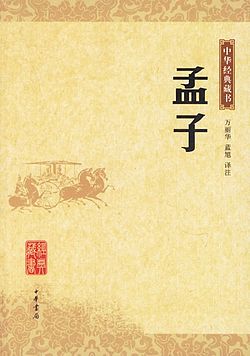- Mencius (book)
-
Mengzi
孟子
2006 edition from Zhonghua Shuju PublishingAuthor(s) Mencius Country China Language Chinese Genre(s) Philosophy Mencius (book) Chinese 孟子 Transcriptions Mandarin - Hanyu Pinyin Mengzi Min - Hokkien POJ Bēng-chú Wu - Romanization man tsy Cantonese (Yue) - Jyutping maang6 zi2 The Mencius (Chinese: 孟子; Mandarin Pinyin: Mengzi; Jyutping: maang6 zi2), commonly called the Mengzi, is a collection of anecdotes and conversations of the Confucian thinker and philosopher Mencius. The work dates from the second half of the 4th century BC.[1] It was ranked as a Confucian classic and its status was elevated in Song Dynasty. Zhu Xi, the scholar generally credited with the founding of Neo-Confucianism, included the Mengzi as one of the Four Books, and it became one of the canonical texts of Neo-Confucianism.
Throughout Chinese history there have been several different theories regarding the authorship of the Mengzi. The famed Han Dynasty historian Sima Qian believed that Mencius himself wrote the book with the participation of his students Wan Zhang and Gongsun Chou. Zhu Xi, Zhao Qi, and Qing Dynasty Confucian scholar Jiao Xun believed that Mencius wrote the book himself without any participation from other scholars. Tang Dynasty writers Han Yu and Su Shi, as well as 12th century scholar Chao Gongwu, believed that Wan Zhang and Gongsun Chou wrote the book after Mencius' death from their own records and memories. Like all Chinese classics, the Mengzi has been annotated many times throughout history, but those of Zhao Qi, Zhu Xi, and Jiao Xun are considered the most authoritative.
The Mengzi did not initially enjoy a preeminent position among the great works of Classical Chinese. In the Book of Han's list of notable books and classics, the Mengzi is listed only among the miscellaneous minor works. Emperor Wen of Han officially listed the Mengzi, along with the Analects, the Classic of Filial Piety, and the Erya, among the "Teachings and Records of Master Scholars", giving it Imperial approval. During the Five Dynasties and Ten Kingdoms Period, Emperor Meng Chang of Later Shu included the Mengzi in his project of engraving Chinese classics upon stone stele, which likely marks its earliest entrance into the category of true Chinese classics. During the reign of Emperor Xiaozong of Song, Zhu Xi declared the official addition of "The Four Books" (Chinese: 四書) — the Mengzi, the Analects, the Great Learning, and the Doctrine of the Mean as Chinese classics all students should learn. By the Ming Dynasty and Qing Dynasty, the Mengzi was part of the material tested on the Imperial examinations.
Notes
External links
- English Translation of the Mencius with comments by James Legge
- Mengzi Chinese text with English translation
- Mencius (Selections), translated by A. Charles Muller
Confucian Texts The Four Books The Five Classics The Three Commentaries The Thirteen Classics Classic of Poetry • Classic of History • Rites of Zhou • The Ceremonies and Rites • Classic of Rites • Classic of Changes • The Commentary of Zuo • The Commentary of Gongyang • The Commentary of Guliang • The Analects • Luxuriant and Refined Words • The Classic of Filial Piety • The MenciusOther Categories:- Chinese classic texts
- Confucian texts
- Humanism
- East Asia stubs
- China stubs
- Philosophy book stubs
Wikimedia Foundation. 2010.
